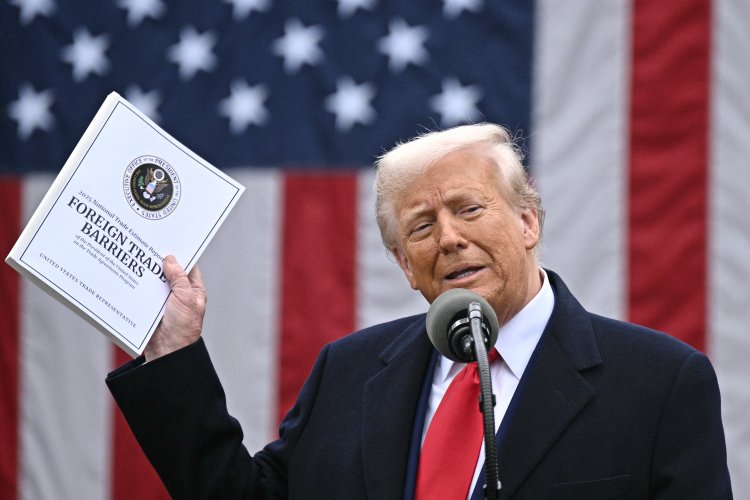Why the Next Successor to Trump Will Emerge from the Trade Wars
Ted Cruz launched the initial attack regarding Trump’s tariffs. However, he is not the only one preparing for the upcoming GOP nomination battle.

Take Sen. Ted Cruz from Texas, for example.
“I worry, there are voices within the administration that want to see these tariffs continue forever and ever,” Cruz expressed recently on his podcast. “The goal of President Donald Trump’s shock maneuvers should be to dramatically lower tariffs abroad and result in dramatically lowering tariffs here.”
Cruz’s remarks implicitly position him against trade hardliners in the current administration, including Peter Navarro, a Trumpist trade advisor, and U.S. Trade Representative Jamieson Greer. However, Cruz is also diverging from key 2028 contenders, JD Vance and Steve Bannon, who were the top two vote-getters in the recent Conservative Political Action Committee straw poll.
Bannon, a former advisor to Trump, has long taken on the role of an “economic nationalist.” Meanwhile, the new vice president has carved out his own niche, appealing to the “new right” that rejects traditional Reagan and Bush-era economic principles. This faction aligns with institutions like the protectionist American Compass and the youth-oriented American Moment, as well as the Buchananite The American Conservative magazine.
Both Vance and Bannon are expected to make presidential bids, despite the buzz about a potential third term for Trump.
With trade nationalism seemingly saturated, other candidates are staking claims in the crumbling landscape of free-market conservatism.
Nikki Haley, the former governor of South Carolina and U.N. ambassador, has been doing this for years. In a February 2024 op-ed, she criticized Trump’s tariff plan, calling it a joke: “Imagine if a presidential candidate promised to raise taxes on every American. Imagine if he promised to make life even harder for the middle class and the least fortunate. That candidate … should be laughed off the stage and defeated at the ballot box.”
Despite not winning at the ballot box, Trump’s position hasn’t stopped Haley from becoming a senior figure among the free-market skeptics at the Wall Street Journal editorial board, which is influenced by Rupert Murdoch. “This is no time to go wobbly on capitalism,” Haley wrote in Murdoch’s publication back in February 2020.
That faction is likely eager to capitalize if economic nationalism falters during a massive recession. However, there’s a careful balance to maintain; the free-market advocates do not want the GOP’s chances in 2028 to be completely undermined.
This month, the WSJ editorial board is discussing the long-standing relevance of the controversial Smoot-Hawley Tariff Act, pushing back against Senate GOP leaders like John Barrasso of Wyoming. Barrasso’s offense?
“Barrasso … similarly pretends tariffs are a swell idea," the Journal criticized. “Back in the day, he was one of many Hill Republicans to support the Trans-Pacific Partnership. Barrasso wore his free-trade credentials more lightly during Mr. Trump’s first term, but he wore them. In his 2018 reelection campaign, he distanced himself from Mr. Trump’s tariffs — no easy thing in a state as red as Wyoming.”
While Barrasso might not be a contender for president, every other Republican candidate certainly understands the implications of the WSJ's critique: traditional conservative strongholds are preparing for a clash in the upcoming GOP primary.
With Trump absent from the stage in 2028, aspiring candidates are keen to attract the Journal and the establishment’s support, especially as Vance and Bannon dominate the new faction. Additionally, a fresh face sympathetic to the traditional ideals of ‘free’ trade has emerged: Elon Musk, who recently criticized Navarro as an “idiot.”
Musk's libertarian economic views—coupled with his willingness to spend like a true capitalist—could become an asset for the 'free' traders.
Florida Gov. Ron DeSantis was Musk’s initial choice for the 2024 presidential race before his campaign faltered. DeSantis has largely refrained from commenting on the tariff issue, which may be telling. With no love lost for Trump, the governor seems willing to gauge the political landscape for 2028. His political operation shares significant ties with Cruz, including consultant Jeff Roe, who advised on key “Trump alternative” projects over the past decade, indicating DeSantis' true inclinations. He represents the “normie” Republican stance on trade.
Outgoing Virginia Gov. Glenn Youngkin occupies a similar space—not as hardline as Vance and Bannon, but not as traditional as Haley and Cruz.
With an opportunity to support the administration, the influential Youngkin told The New York Times that “no one should be surprised” and emphasized “the necessary rebalancing of our trade negotiations or trade relationships that needs to happen,” but stopped short of stating whether the administration is taking the “right” approach.
Former Vice President Mike Pence, though not part of the new Trump administration, is unlikely to shy away from criticizing it while keeping his options open for 2028. Pence has established a new think tank and sees himself as not only a critic of Trump’s social conservatism and militarist foreign policy but also as a proponent of Friedmanite economic principles.
“The Trump Tariff Tax is the largest peacetime tax hike in U.S. history. These Tariffs are nearly 10x the size of those imposed during the Trump-Pence Administration and will cost American families over $3,500 per year,” Pence remarked on X.
In response, Trump’s Commerce Secretary Howard Lutnick criticized Pence, stating: “Mike Pence is just bitter. These tariffs are the definition of America First, which is a concept he doesn’t understand.”
Beyond tariffs, early divisions among the 2028 contenders are evident. Traditional Republicans like Haley and Pence diverge sharply from the newer wing’s inclination toward moderation in foreign relations, particularly regarding Russia and Iran.
The contest to define America First in the post-Trump era has only just begun.
Aarav Patel for TROIB News
Find more stories on Business, Economy and Finance in TROIB business












